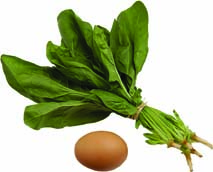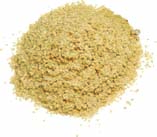Essential nutrients
Some say, “you are what you eat.” In some ways this is true. Our physical and mental health depends on how many nutrients we are getting from our daily diets.

+ A basic and essential nutrient is water, the most important element for our bodies after oxygen. We need between 8 to 10 glasses of water daily, which we get from the foods and drinks we consume.
We need water to transport nutrients and waste through our bodies and to release toxins through sweat and urine. Water is a principal component of the fluids that our bodies use for digestion; it helps to regulate our body temperatures and to keep the digestive system functioning correctly.
HEALTHY CALORIES
Calories come from carbohydrates or glucides, proteins and fats or lipids. These nutrients must arrive to the body in the appropriate proportions.
• 50 to 55 % of calories should come from carbohydrates, with most of these coming from special carbs that are called “complex carbohydrates”. These are absorbed slowly and generally contain fiber. Complex carbohydrates are found in whole grain cereals and derivatives (such as flour and baked goods without fats), beans and derivatives, starchy vegetables (potato, sweet potatoes, cassava, corn), and other fruits and vegetables.
• 15 to 20 % of calories should come from low-fat proteins. For example: lean meats, egg whites, hard cheeses and skim dairy products and also beans.
• 30 % of calories should come from fats made up of healthy fatty acids. The healthiest type of fats are monounsaturated -olive, corn, canola oils- can be eaten. Our bodies also need saturated fats -animal derived fats- but should be eaten in moderate quantities because saturated fats over time can block heart arteries.
• Polyunsaturated fats -oils from seeds and nuts- are also healthy, but should be eaten in moderation, because they oxidize easily and wear out cellular membranes. For this group the following are especially recommended: dried nuts, avocado, seeds.


FOR WATER
When talking about drinking sufficient liquids, nutritionists advise to drink water. You can complement water consumption with fruit and vegetable juices and infusions. Freshly squeezed fruit and vegetable juices are healthy and rich in vitamins, minerals and antioxidants.
FIBER
Our body needs fiber daily, at least 1 oz/ 30 g per day. Insoluble fiber (in water) benefit intestinal health; soluble fibers help aid in metabolism; because they improve the absorption and breakdown of sugars and fats in the blood, helping to reduce blood cholesterol levels. To get the minimum recommended dose of fiber it's recommended eating whole grains, beans and plenty of fruits and vegetables.

MINERALS
These are essential for the formation of the organs and tissues that support the multiple functions vital for the body.
∎ Calcium. A basic nutrient for healthy bones and teeth, as well as supporting nerve transmission and muscular movement. It's necessary to get at least 1,000 mg of calcium per day; you can easily get high quality calcium through the consumption of dairy products, but also in dried nuts, seeds, barley, fish with small bones (sardines).

∎ Iron. Forms part of red blood cells and helps to transport oxygen to body tissues. Iron derived from meats are the best absorbed. Iron from green leafy vegetables, beans, eggs and fortified foods is absorbed less easily. It's recommended eating iron rich foods together with other foods that contain vitamin C.

∎ Sodium. This mineral is absorbed in the body through table salt and a number of prepared foods (bread, crackers, breakfast cereals, cheeses and deli meat). It's important to avoid eating excess sodium, because it can increase your risk for high blood pressure and edema. Prioritizing fresh foods and seasoning with plenty of herbs and spices decreases the amount of salt used in cooking, while keeping foods flavorful.

∎ Potassium. It's important to get enough potassium, because it protects the body against high blood pressure. It's best to eat plenty of fresh fruits and vegetables.
∎ Magnesium. This mineral regulates with calcium to keep the bones and teeth healthy. It also keeps the neuromuscular system balanced. It is found in whole grains, deep green leafy vegetables, fish and meat, seeds and dried nuts.

∎ Zinc. This mineral also contributes to the health of the bones, skin and hair, as well as increasing the defenses against free radicals. It is present in dairy products, meats and grains.

∎ Selenium. This is an important antioxidant for protecting body tissue. It also fortifies the action of the antioxidant vitamin E. It is found in beans, fish, dried fruits, nuts and cabbage family vegetables.

VITAMINS
All vitamins are vital for the body's health. For optimal absorption you should try to eat fresh vegetables, either raw or cooked. There are fat-soluble and water soluble vitamins.
Fat-soluble vitamins need fatty acids for absorption, they also accumulate in fatty deposits in the body. The following are fat-soluble vitamins:
∎ Vitamin A. This vitamin helps to keep the skin and sight healthy. It protects the body against infections. Natural sources include: dairy products, eggs, green veggies and red and orange vegetables.

∎ Vitamin E. Strong antioxidant that helps in the formation of red blood cells. Found in sunflower and corn oils, seeds and dried fruits.

∎ Vitamin D. Supports the breakdown and absorption of calcium. Sunlight activates the synthesis of this vitamin in our bodies. It is found in milk, yogurt, eggs and entrails. Water-soluble vitamins need water to be absorbed; they are flushed out of the system through urine, making daily intake of water-soluble vitamins a necessity. These vitamins aren't stored in the body.
∎ Vitamin C. Helps to keep body tissue strong and keep the hair healthy. It helps in the absorption of iron and acts as an active antioxidant. It is found in citrus fruits, kiwi, tomatoes, peppers and cabbage family vegetables.

∎ Vitamin B 1 . Helps to keep the nervous system and brain active and healthy. This vitamin is fundamental for proper metabolism of carbohydrates. It is found in whole grain cereals and derivatives, wheat germ, brewer's yeast and meat (especially in pork).
∎ Vitamin B 2 . Essential for the skin's health and eyesight. It supports metabolism. Natural sources are dairy products, meat, dried fruits, nuts and beans.

∎ Vitamin B 3 . Protects the skin's health and the digestive system. It supports metabolism. All foods high in protein are natural sources: meats, beans, cereals, dairy products and eggs.

∎ Vitamin B 12 . Fundamental for the development of red blood cells. Vegetarians should make sure to find alternative sources for this vitamin, because it is only found in animal derived products -meats, eggs, dairy products and specially fortified cereals.

∎ Folic acid. This vitamin is very important for the synthesis of DNA (making it an essential vitamin before conception and during the first months of pregnancy). Natural sources are fresh green vegetables or slightly cooked vegetables, whole grains, beans and fruits.

∎ Beta carotenes. These aren't exactly vitamins, but some are considered to be provitamin A and are all important natural antioxidants. They are found in yellow and orange vegetables such as carrots and squash. They are also found in some red vegetables such as peppers and tomatoes.


Comment about this article, ask questions, or add new information about this topic: